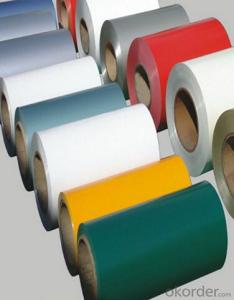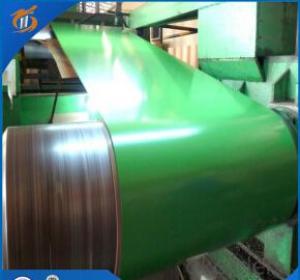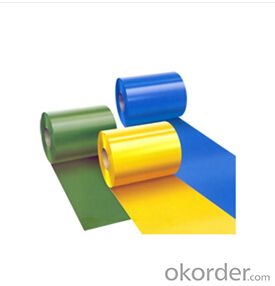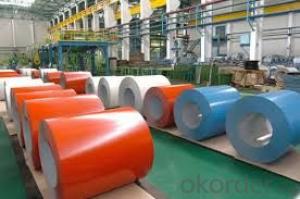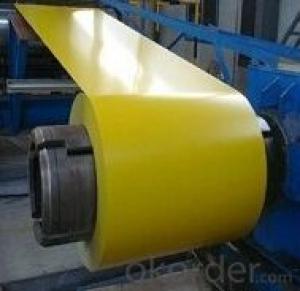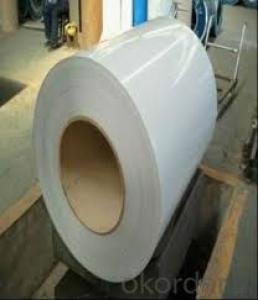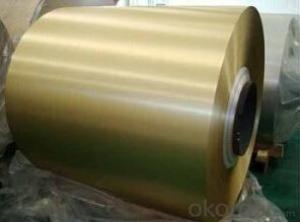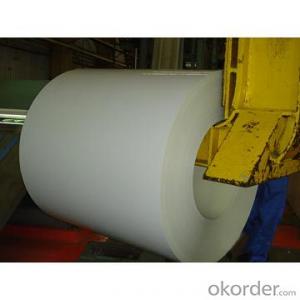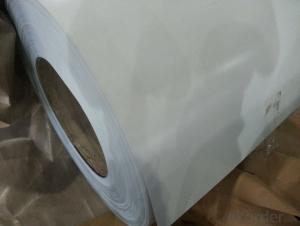PPGI Color Coated Steel Coil for Constructions
- Loading Port:
- Shanghai
- Payment Terms:
- TT OR LC
- Min Order Qty:
- 25 m.t.
- Supply Capability:
- 10000 m.t./month
OKorder Service Pledge
OKorder Financial Service
You Might Also Like
Basic Info.
Model NO.:JISG3312, SGCC
Surface Treatment:Galvanized
Certification:ISO, SGS
Technique:Cold Rolled
Standard:ASTM, JIS, AISI, DIN
Application:Container Plate
Edge:Slit edge
Stock:Stock
Steel Grade:Q235B
Thickness:0.12mm-3.0mm
Coil Weight:3-8 Tons
Gloss:65%-80%
Export Markets:Global
ID:508mm
Zinc Coating:50g-250g/Psm
Feedback:Within 24 Hours
Additional Info.
Packing:Export Standard Package or as Request
Standard:AISI, ASTM, BS, DIN, GB, JIS
HS Code:7210701000
Production Capacity:150, 000tons/Year
Product Description
Specifications:
1. Thickness: 0.12mm-1.3mm
2. Width: 600mm-1250mm
3. Length: According to client's demands
4. Top paint: 15 to 25 um (5 um + 12-20 um)
Back paint: 7 +/- 2 um
5. Gloss: Normal or High gloss
6. Zinc coating: Z50-Z275G/psm
7. Inside Diameter: 508mm/610mm
8. Outside Diameter: 1000mm-1500mm
9. Coil weight: 3-8 tons
10. Payment: T/T, L/C, D/P, Paypal, Western Union
11. Trade Term: FOB, CFR, CIF
12. MOQ: 25 Mt
13. Package: Export standard package or as request
14. Shipment: By container
15. Standard: AISI, ASTM, BS, DIN, GB, JIS
16. Grade: JIS G3322, CGLCC, ASTM A755, CS-B
Basic Information:
Product/Service (We Sell): steel sheet pile, steel rail, h-beam, rebar, steel pipe, steel strip, plate ,stainless steel and galvanized steel.
Number of Employees: about 100 People.
Trade & Market
Main Markets:
North America, Canada
Export Percentage: 65% - 81%
- Q: How do steel coils contribute to the renewable energy equipment industry?
- Steel coils contribute to the renewable energy equipment industry by playing a crucial role in the manufacturing of various renewable energy components. They are used to create structural frames, support structures, and brackets for wind turbines, solar panels, and other renewable energy systems. Additionally, steel coils are essential in the production of electrical transformers and transmission lines, which are integral to the distribution of renewable energy. Overall, steel coils provide the strength, stability, and durability required for the efficient and long-lasting operation of renewable energy equipment.
- Q: Are steel coils used in the packaging industry?
- Yes, steel coils are commonly used in the packaging industry for various applications such as securing and protecting products during transportation and storage. The strong and durable nature of steel coils makes them ideal for packaging heavy or bulky items, providing stability and preventing damage.
- Q: How are steel coils used in the production of automotive exhaust systems?
- Steel coils are typically used in the production of automotive exhaust systems as they provide the necessary material for manufacturing exhaust pipes and components. The coils are often processed and shaped into the desired forms, such as tubes or mufflers, and then welded or fastened together to create the exhaust system. Steel coils are favored due to their durability, heat resistance, and ability to withstand the harsh conditions of exhaust gases, ensuring the longevity and efficiency of the automotive exhaust system.
- Q: What are the dimensions of steel coils used in the construction equipment industry?
- The dimensions of steel coils used in the construction equipment industry can vary, but they are typically around 48 to 72 inches in width and have an outer diameter of 60 to 80 inches. The weight of these coils can range from 5,000 to 30,000 pounds.
- Q: what do they use to make stainless steel?and can stainless steel be melted again and again without losing it's Specifications
- The stainless steel is a family of ferrous alloys containing at least 11% chromium. The effect of this amount of chromium in steel in reducing corrosion is dramatic. There are many grades of stainless steels. By varying the chemical composition, heat treating, and cold-working, a wide range of properties is achieved. There are three types of precipitation hardening stainless steels: *martensitic types, which are supplies in the martensitic condition, are hardened by a simple aging treatment of the fabricated part. *Semi austenitic types, which are supplied in the austenitic condition, are transformed to martensite by special heat treatment before precipitation hardening. *the austenite in the austenitic types is precipitation hardened directly. The heat treatments of precipitation-hardening stainless steels are chosen to optimize mechanical properties. Precipitation hardening generally results in a slight increase in corrosion susceptibility and an increased susceptibility to hydrogen embrittlement.
- Q: Can steel coils be cut?
- Yes, steel coils can be cut using various methods such as shearing, sawing, or laser cutting, depending on the thickness and type of steel.
- Q: What are the potential dangers of handling steel coils?
- The potential dangers of handling steel coils include the risk of injuries due to their heavy weight and sharp edges, the possibility of crushing accidents or being struck by falling coils, and the potential for back or muscle strain from manually lifting or moving the coils.
- Q: Ive been playing with my ping i3 graphite irons for 6 years now and some days i can hit it and some days i cant. Then i tried out my friends irons the other day and he had steel and i was hitting the ball anywhere i wanted it to go..Is that a fluke or is steel irons just better than shaft? I was thinking about trading my graphites for steel, is that a good idea??
- Graphite Or Steel Irons
- Q: How do steel coils contribute to the HVACR industry?
- The HVACR industry relies heavily on steel coils, which play a vital role in various applications. These coils, typically made from durable and corrosion-resistant materials like stainless steel or galvanized steel, ensure longevity in demanding HVACR environments. Air conditioning systems commonly use steel coils to transfer heat between the refrigerant and the surrounding air. These coils, also known as evaporator coils, absorb heat from indoor air, cooling it down and removing moisture. The heat is then released outside through a condenser coil, enabling efficient cooling and dehumidification. Heat exchangers, crucial components in HVACR systems, also utilize steel coils. These coils, often in the form of finned tubes, provide a large surface area for efficient heat transfer, enhancing overall system efficiency. In the construction of ductwork, steel coils are extensively employed. These coils are shaped and sized to fit specific ductwork designs, ensuring optimal airflow and temperature control. Their durability and strength allow them to withstand the pressure and forces exerted by airflows in duct systems. Refrigeration systems rely on steel coils to transfer heat out of enclosed spaces, such as refrigerators or freezers. These coils, called condenser coils, release heat from the refrigerant as it changes from a high-pressure gas to a high-pressure liquid. Steel coils are essential in the food service and cold storage industries, where they enable the cooling and preservation of perishable goods. Overall, steel coils significantly contribute to the HVACR industry by facilitating efficient heat transfer, optimal temperature control, and reliable operation of various systems. Their durability, corrosion resistance, and versatility make them crucial components in providing comfortable and controlled environments in residential, commercial, and industrial settings.
- Q: What is the thickness range of steel coils?
- The thickness range of steel coils varies depending on the specific application and industry. However, generally speaking, steel coils can have a thickness range from as thin as 0.005 inches (0.13 mm) to as thick as 0.5 inches (12.7 mm) or more.
Send your message to us
PPGI Color Coated Steel Coil for Constructions
- Loading Port:
- Shanghai
- Payment Terms:
- TT OR LC
- Min Order Qty:
- 25 m.t.
- Supply Capability:
- 10000 m.t./month
OKorder Service Pledge
OKorder Financial Service
Similar products
Hot products
Hot Searches
Related keywords
